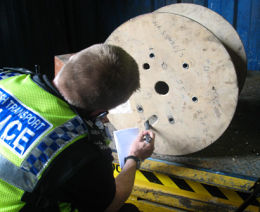Posted 7th June 2011 | No Comments
Copper price triggers steep rise in rail cable thefts

A BTP officer checks a cable drum
THE menace of railway cable thieves has reached new heights, according to figures published by British Transport Police.
Although general levels of crime on the railways have continued to fall, the force says that cable theft has risen by 70 per cent.
The BTP reported that crime on the railways fell by 2.9 per cent in 2010/11, the seventh successive annual decrease.
The figures include a 2.8 per cent fall in violent crime and a 1.6 per cent reduction in robberies.
Cable thefts are soaring, however, because 'economics are having their effect', according to BTP chief constable Andy Trotter. There were 2,712 cable thefts in 2010/11, compared to 1,593 in 2009/10.
Mr Trotter said that in "difficult economic times acquisitive crime is likely to increase, and these figures show that".
He added: "Cable theft is a real challenge for us, the rail industry and other utilities. The record price of metals on world markets has made this type of crime seem increasingly attractive, although the actual returns to the thieves are pretty modest.
“Metal theft causes significant disruption to rail services and that means real consequences for real people - missed business meetings, family celebrations and appointments, for instance. And that’s not to mention the huge financial costs to the rail industry and the dangers to the thieves themselves.
“We have increased the resources we are devoting to this issue and are working closely with Network Rail to find more effective ways of reversing this trend.”
But the incidence of disruption caused by cable thefts is rising. First Great Western has apologised for disruption on its network last week, and named cable theft as one of the reasons. FGW managing director Mark Hopwood said: "A number of unrelated infrastructure failures, a trackside cable theft, vandalism and a suicide resulted in our train service being significantly disrupted."
Network Rail's budgets are also being hit by the problem. Cable theft has cost the company some £43 million over the past three years – it has to pay for the repairs and also compensate train operators for disruption.
Dyan Crowther, who is Network Rail's director of operational services, said: “These criminal acts have to stop. Every day passengers and essential freight deliveries upon which our economy relies are being delayed by thieves looking to make a quick buck at our expense.
“I cannot over-emphasise just how serious these crimes are. Cable thieves deny passengers the service they rightly expect and, through the massive cost to the industry, deny everyone improvements to rail services."
